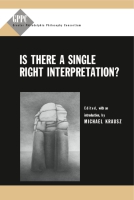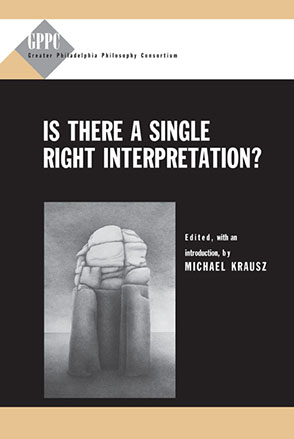Is There a Single Right Interpretation?
Michael Krausz
“Interpretation is as irritating as it is fascinating. To think that a work like Hamlet or The Upanishads has only one correct interpretation seems arrogant. To allow more than one brings us perilously close to contradiction. This collection brings together a series of searching and subtle papers that illuminate the metaphysical, epistemological, phenomenological, and action-theoretical facets of interpretation, providing resources for a more nuanced understanding of interpretation and its objects.”
- Description
- Reviews
- Bio
- Subjects
The fundamental conflict between positions that universally require the ideal of a single admissible interpretation (singularism) and those that allow a multiplicity of some admissible interpretations (multiplism) leads to a host of engrossing questions explored in these essays: Does multiplism invite interpretive anarchy? Can opposing interpretations be jointly defended? Should competition between contending interpretations be understood in terms of (bivalent) truth or (multivalent) reasonableness, appropriateness, aptness, or the like? Is interpretation itself an essentially contested concept? Does interpretive activity seek truth or aim at something else as well? Should one focus on interpretive acts rather than interpretations? Should admissible interpretations be fixed by locating intentions of a historical or hypothetical creator, or neither? What bearing does the fact of the historical situatedness of cultural entities have on their identities?
The contributors are Annette Barnes, Noël Carroll, Stephen Davies, Susan Feagin, Alan Goldman, Charles Guignon, Chhanda Gupta, Garry Hagberg, Michael Krausz, Peter Lamarque, Jerrold Levinson, Joseph Margolis, Rex Martin, Jitendra Mohanty, David Novitz, Philip Percival, Torsten Pettersson, Robert Stecker, Laurent Stern, and Paul Thom.
“Interpretation is as irritating as it is fascinating. To think that a work like Hamlet or The Upanishads has only one correct interpretation seems arrogant. To allow more than one brings us perilously close to contradiction. This collection brings together a series of searching and subtle papers that illuminate the metaphysical, epistemological, phenomenological, and action-theoretical facets of interpretation, providing resources for a more nuanced understanding of interpretation and its objects.”
“It is hard to think of a single work that explains so clearly what these issues are and why they are important. The scholarship is excellent, and the introductory material is especially clear. Highly recommended for all collections.”
“However, the volume has come into being, the essays are well-written and pleasant to read.
Krausz as editor, and as an author whose writings are well-known in this area, offers the reader what must be a difinitive presentation of the current range of views on the subject.”
Michael Krausz is Milton C. Nahm Professor of Philosophy at Bryn Mawr College. He is the author of Rightness and Reasons: Interpretation in Cultural Practices (1993) and Limits of Reason (2000), and he has edited several previous volumes, including The Interpretation of Music: Philosophical Essays (1993).
Mailing List
Subscribe to our mailing list and be notified about new titles, journals and catalogs.




